|
By Donald H. Harrison
EHRENBERG, Ariz.— There's a debate of sorts, which can't be resolved here,
between Jewish historians and others about whether Herman Ehrenberg, the
namesake of this town on the eastern bank of the Colorado River, was a Jew or a
Lutheran. But there's full agreement that the man who named the town in
Ehrenberg's honor—Michael Goldwater, grandfather of 1964 Republican U.S.
presidential candidate Barry Goldwater—was indeed a Jew.
Herman Ehrenberg is listed in various Jewish sources as one of the first Jews to
enter Arizona. However, other sources suggest he may have been of noble German
and Christian birth. Because Ehrenberg was a survivor and eye-witness historian
of the Goliad Massacre during the Texas Revolution, and because he later surveyed much of
Arizona and worked as well in California and Hawaii, details of his life
have been of interest throughout the western United States.
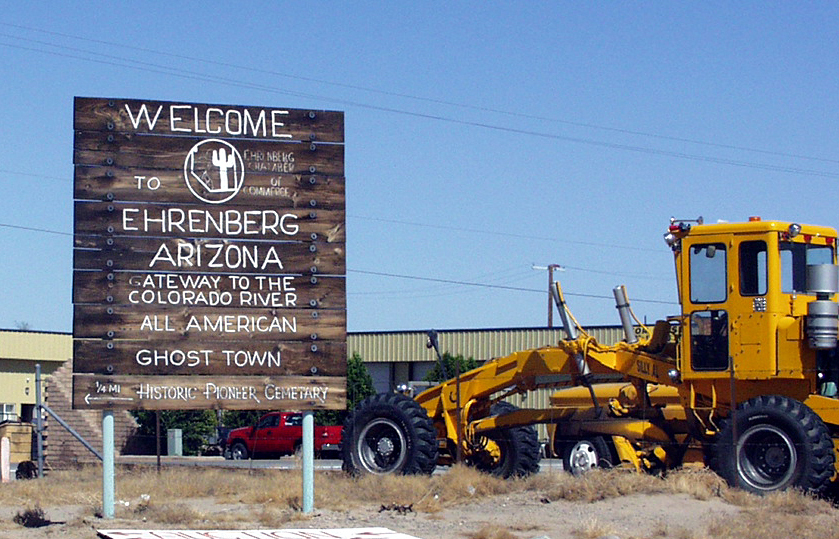
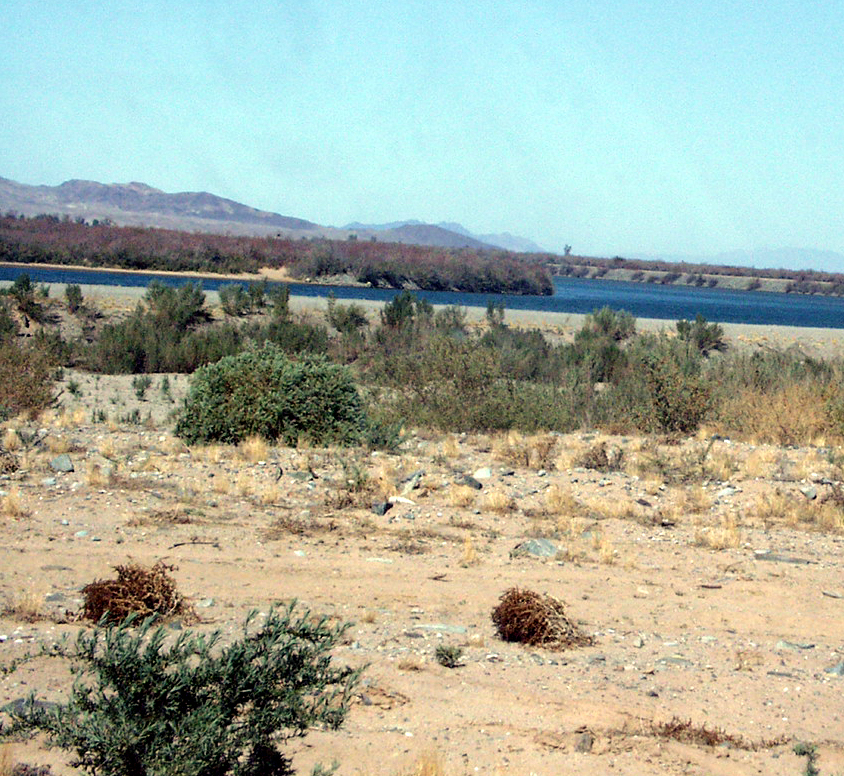
Ehrenberg on the east bank of the Colorado River just
north of Interstate-10 once was considered a ghost
town, but economic prospects for the town are improving thanks to the appeal of
the river
The respected Handbook of Texas, compiled by the University of Texas,
didn't take sides in the debate, but appeared to lean toward the Lutheran side
of the speculation, with this
entry in its online edition:
Herman
Ehrenberg, surveyor and cartographer, survivor of the Goliad massacre,
writer, and engineer, was probably born in the village of Steuden, Prussia,
where the birth of a Hermann Vollrath Ehrenberg was registered on October 17,
1816, at the Lutheran church. Sources differ as to the identity of his parents.
He may have been the son of William von Ehrenberg, a Prussian royal official, or
his parents may have been Johann and Sophie Ehrenberg. Many historians state
that Ehrenberg was a Jew; if he was, the reason for registry of his name in a
Lutheran church is not clear...
Church registry or not, there's no reason to jump to
conclusions in this matter. I traveled to Germany while researching my biography
of Louis
Rose, who became the first Jewish settler of San Diego in 1850. His
birth in 1807 in Neuhaus-an-der-Oste was registered in the Emmaus Church, for
the very simple reason that there was no synagogue in that small town. As every
birth was required to be registered, it fell on the only church in town to take
on that task regardless of the religion of the registrant. There may have been a
similar situation in Steuden.
Ehrenberg mapped the Gadsden Purchase, worked with Charles D. Poston in laying
out Yuma, Ariz.; did some surveying work in Honolulu, and was murdered while
traveling between San Bernardino and Mineral City, in a place called Dos Palmas,
near present day Palm Springs. His many friends in Arizona, including
brothers Mike and Joe Goldwater, were devastated by the news. After moving
their own store downriver from La Paz, Ariz., to Mineral City, they persuaded
the locals that Ehrenberg would be an even better name for the town that had
grown by the ferry site operated by William and Isaac Bradshaw. Modern-day
Ehrenberg lies just north of the Interstate Highway 40 bridge that crosses from
Arizona into Blythe, California.
In German, "Ehrenberg" means "Honored Mountain," and to the
hills near Ehrenberg go the honor of having been the original source of the
town's expectations of wealth. Herman Ehrenberg, Charles Poston and other
prospectors traipsed over those hills hoping to find rich deposits like the ones
that fueled a California-style gold rush around La Paz, the town for which the
present Arizona county was named.
* * *
Mike Goldwater changed the family name from Goldwasser after
moving from Konin in Central Poland to Paris and later London, where he married
Sarah Nathan in the Great Synagogue in 1850. According to Lee Edwards' online
biography of U.S. Senator Barry Goldwater, the senator's grandfather and great-uncle
Joe temporarily left Sarah in London to seek a fortune as merchants in Sonora,
Calif., 100 miles east of San Francisco. Sarah eventually followed them to California
but preferred stable cities to mining towns as places to raise children,
including Barry's father Baron. The Goldwaters stayed
married, but endured long periods of physical separation.
Joe and "Big Mike" Goldwater meanwhile
opened their business in La Paz, but the development of mud flats cut the town
off from the river, prompting the brothers to relocate to Mineral Springs/ Ehrenberg, where
Joe Goldwater became the postmaster and a school board member—the first
officeholder of the distinguished political family.
Given the fact that Barry Goldwater would run for president as a Republican, it's interesting to note that in
his grandfather's and father's days, the family were Democrats. Mike
and Joe
operated a grain hauling business until deciding to open a store in 1872 in
Phoenix,. Within a short time, the relocated to Prescott, the territorial
capital.
Mike Goldwater's son Morris, a favorite uncle of the future
senator's, was elected mayor of Prescott when he was just 27 and went on to
serve in that position ten times. He also served in the the
constitutional convention that led to Arizona statehood in 1912. Afterwards,
he served as
president of the state Senate.
You can read more of the Goldwater story on line, but of interest here is the
fact that Mike's son, Baron, reopened the Goldwater's store in Phoenix, where he
met his wife. Lee Edwards wrote in his 1995 book:
In his late thirties, still trim and good-looking, Baron became
the town's most eligible bachelor. His parents hoped that all their children
would marry in the Jewish faith, but Mike's death in 1903 followed by Sarah's
death in 1905 allowed them to marry whomever they wished.
Within two years, both brothers were wed, Morris to his
Protestant landlady, Sarah (Sallie) Shivers Fisher, and Baron to a remarkably
independent young woman from the Midwest, green-eyed, auburn-haired,
Episcopalian Josephine Williams, on January 1, 1907. Neither man ever renounced
his faith; Morris, in fact, stipulated in his will that he would have preferred
a Jewish burial but since no rabbi was available, he would settle for a Masonic
burial. They were sons of Moses who had found their Promised Land, after only
twenty years in the wilderness of Arizona. Since there was little or no
organized Jewish religion in those early days, Baron followed the Jewish custom
of allowing his children to be raised in the faith of their mother.
* * *
Madam
Travel Agent and I decided to stop off in Ehrenberg on our way back to San
Diego from Phoenix, and we called ahead to the Chamber of Commerce to ask how we
could learn more about the town. We were referred to Bernice and Duane
"Dutch" Dutcher, former Chamber board members who are the keepers of
the Chamber's historic records and were founders of one of the town's
churches. Former residents of Escondido, Calif., who moved to Ehrenberg in
1988, they have been watching the growth of the neighboring towns of
Blythe, Calif., and Ehrenberg, Ariz., ever since.
Bernice is known as the "poet laureate" of Blythe, as well as the
"bear lady." A hobby of collecting bears has become such a
passion that "Dutch" actually had to add a room to their mobile home
to accommodate all the critters. The Dutchers could have used old Herman
Ehrenberg to do a survey of her collection because she has lost count, but
thinks there are more than 3,000 stuffed, ceramic, wood, fabric and every other
species of non-living bear cohabitating their bedroom, living room, and yard.
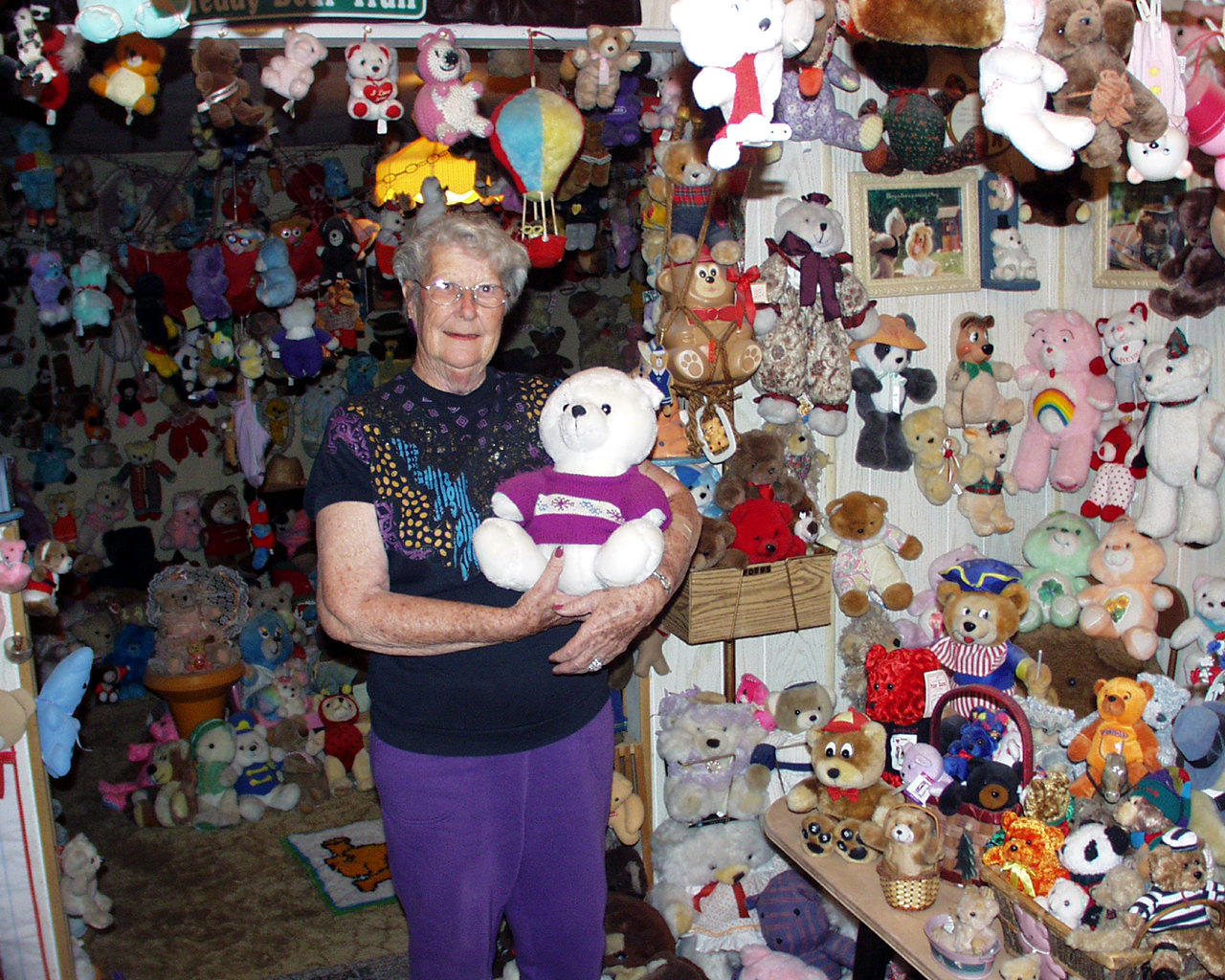 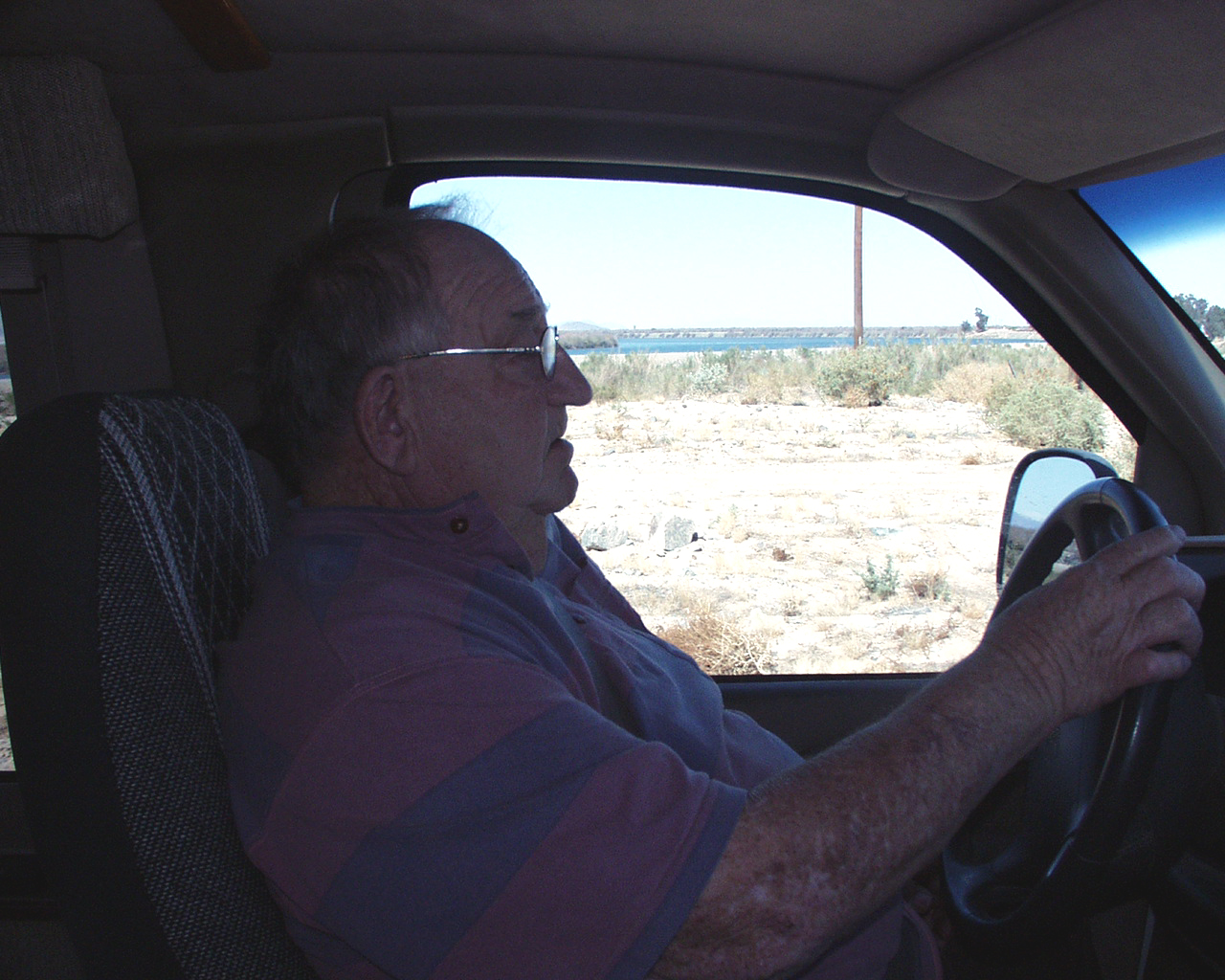
Bernice Dutcher has an extensive collection of toy bears and
is known as the poet laureate of Ehrenberg. Her
husband, Duane, narrated a van tour of the Colorado River town. The couple
arrived in 1988 from Escondido, Calif.
Not the bear, but the desert tortoise is the town mascot of Ehrenberg, and
Bernice was nice enough to share her poem about "Ehren, the turtle"
with us:
Ehren the Turtle
I’m the tortoise
turtle
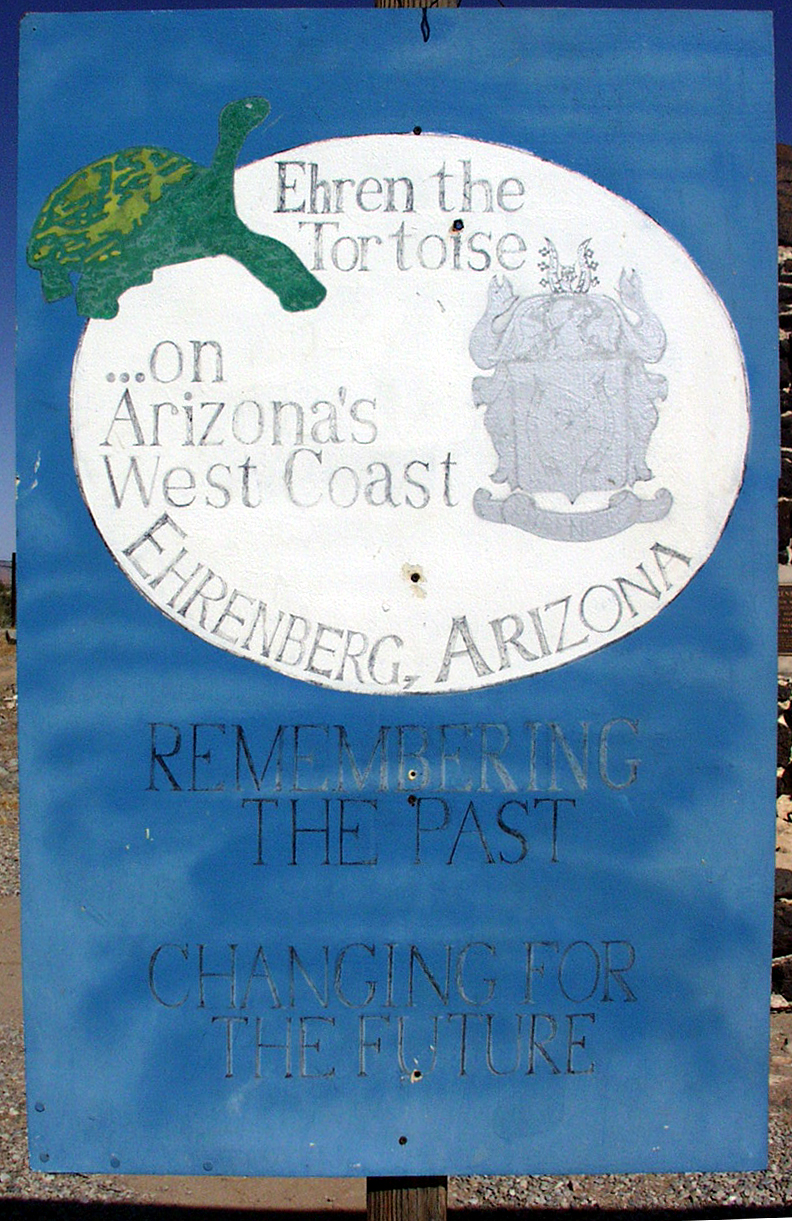
Ehrenberg is my turf
The best little community
On the face of the earth
I’ve been ridiculed
Because my pace is slow
But I accomplish my mission
wherever I choose to go
I cannot stumble
Or even create a fall
I have only one speed
That of a continuing crawl
It takes me a little longer
To do what I have to do
But if your legs were short like mine
It would take you longer too
At times I' ve stuck out my neck
But that doesn’t always prove stable
Because I could end up an entrée
On some elite’s dining room table
But in spite of the criticism
I’ve been chosen by the chamber
For me to be their mascot
And accepted by every member
Whenever I endeavor
I always have lots of fun
I may not come in first
But at least I get the job done
—Bernice Dutcher
For good measure, I also asked and received permission to
reprint her poem about life in the small river town.
Why I Like Ehrenberg
Laid back in the desert
Is a very small town
Ehrenberg is its name
Not one of renown
You needn’t be
wealthy
Or a person of
fame
Everyone knows
you
By your first
name
You can leave your house
Without fixing your hair
The people you meet
Really don’t care
You can go to the store
Without jewelry or a hat
These aren’t needed
To have a friendly chat
Neighbors and family
Become best friends
And help one another
Till the very end
Yes, we all pull together
For that’s our way
We may be remote
But we’re here to stay
—Bernice Dutcher
We transferred to Dutch's van for a look-see at Ehrenberg.
We went down to the river by the big interstate bridge, which was once the site
of the Bradshaw's ferry. We walked along banks that Herman Ehrenberg and
"Big Mike" Goldwater probably knew well. After the bridge was
built, people driving cars seemed in such a hurry to get to the California
coast, they didn't stop very often in Ehrenberg. That post office with
which Joe Goldwater launched the family's political dynasty closed in
1914. Ehrenberg was listed as a "ghost town" in some tour
guides.
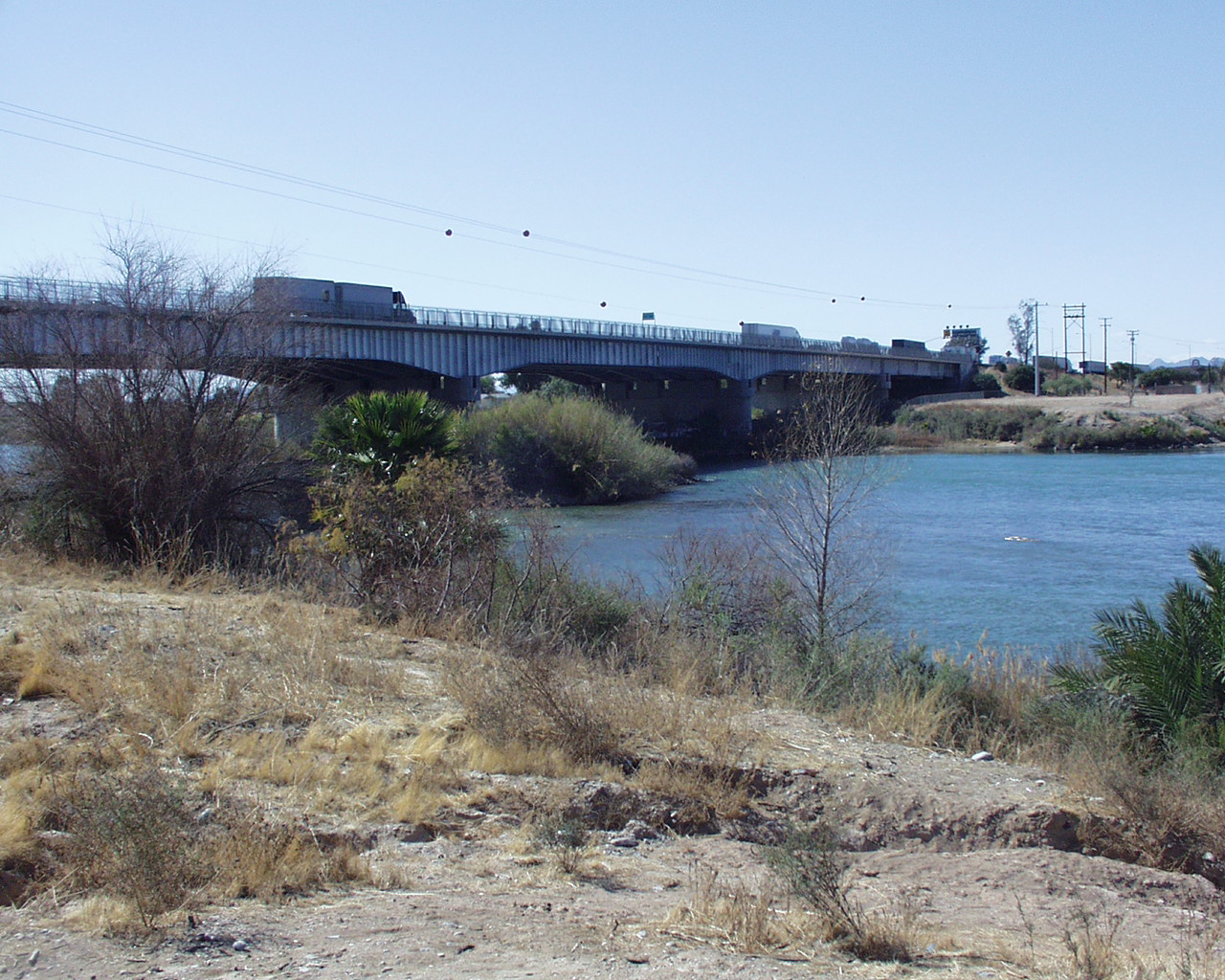
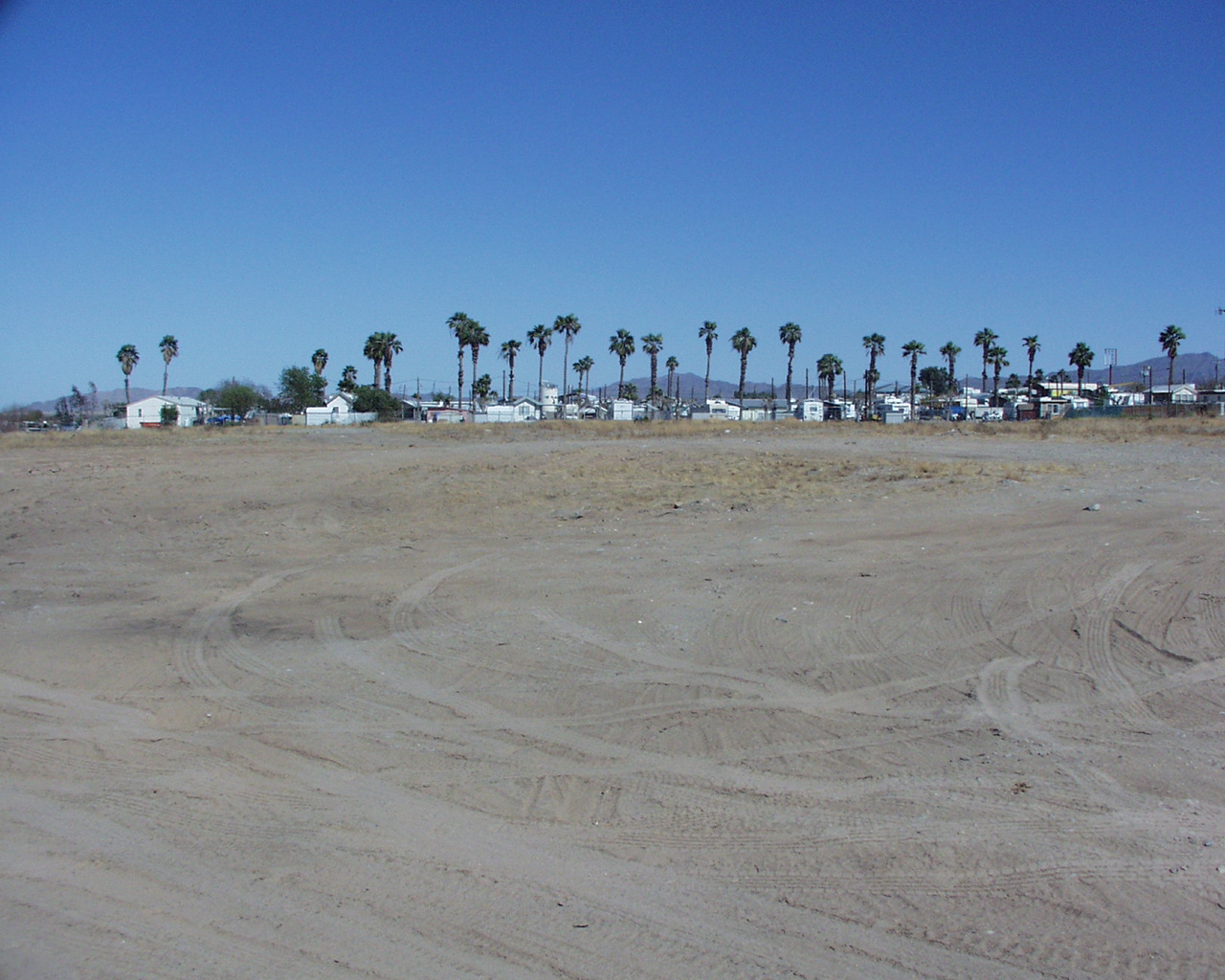
The Interstate 10 bridge over the Colorado River is located
near the old Bradshaw Ferry Landing. From the
banks the town of Ehrenberg looks like a small oasis of palms.However, people started returning to the river, and by 1958 they were able to
persuade the Post Office to reopen the branch. Mobile home parks like the
one in which the Dutchers live sprung up. Boating facilities and some industry
developed as well, particularly that of reconditioning trailers. Tourism
brings some people to the area, and until it was banned a few years ago,
cockfighting was quite popular. Hobbyists like Bernice, who always looks for a
bargain on bears, come to the area from all over the country to attend the
"Main Event" a several month long, buying- and- trading marathon
that turns the small town of Quartzsite, Ariz., about 15 miles to the east of Ehrenberg,
into a city-sized flea market.
History buffs like myself inevitably are drawn to the Pioneer cemetery,
where graves are covered with stones to prevent the critters from digging them
up. Most of the people buried there are unidentified. One big mound
in the small cemetery is said to include both a horse and its former rider.
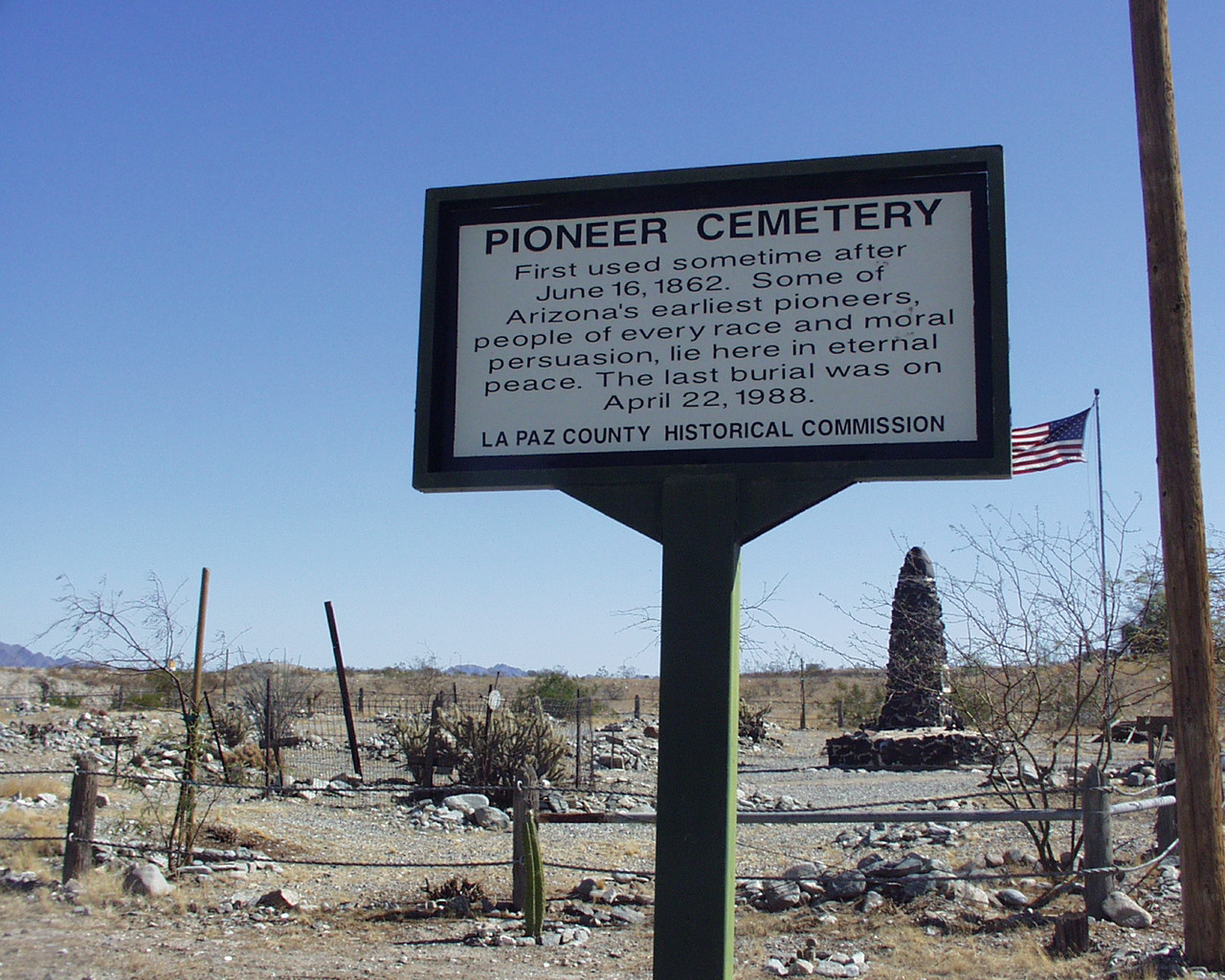 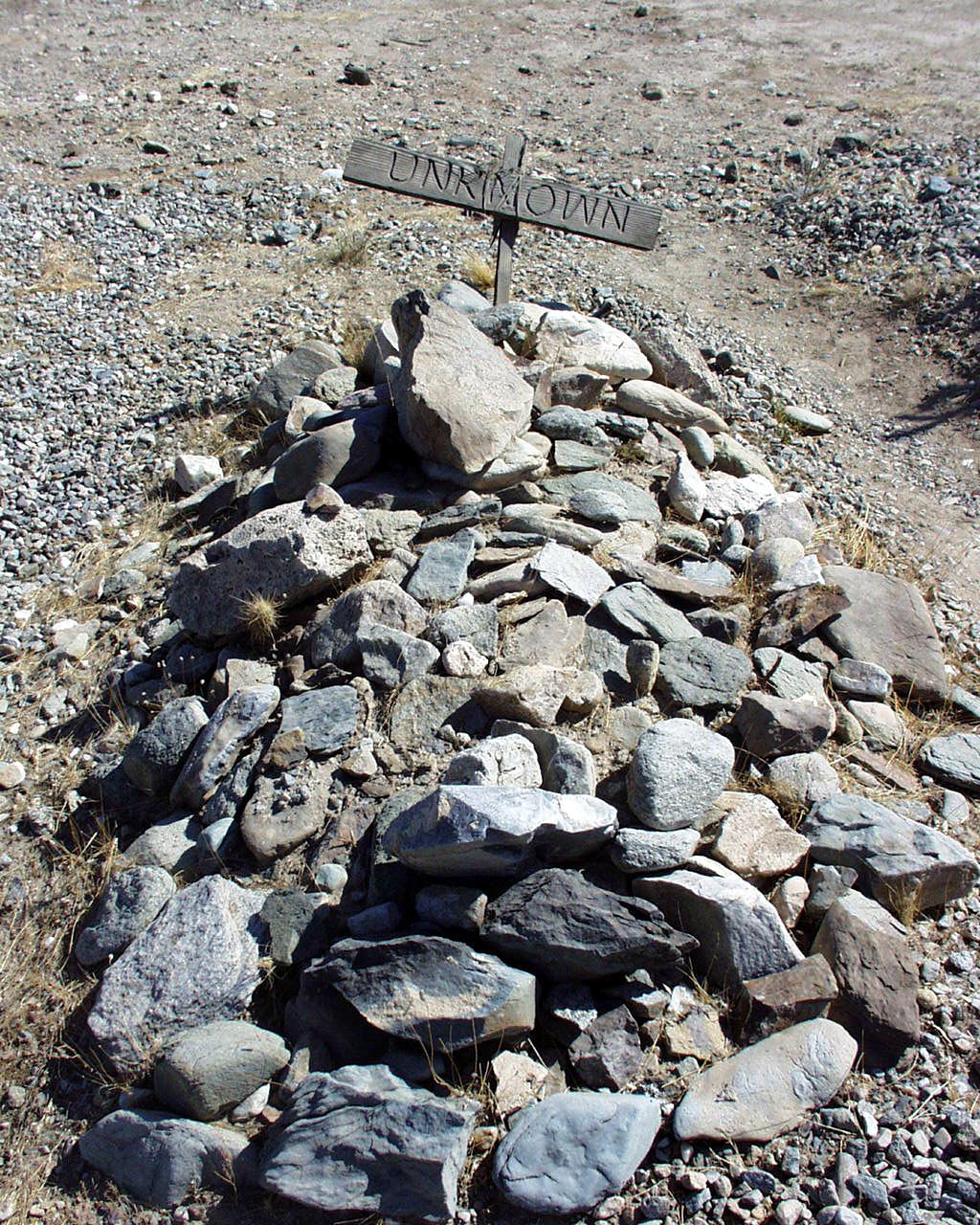
Pioneer Cemetery in Ehrenberg draws numerous historians.
(click photos to read signs)
The talk is that changes may be in the wind, or at least the water, for
Ehrenberg. Modernized campgrounds, boat launching facilities, and a new
housing development anticipate Californians and Arizonans may want get-away
homes along the river. It's possible that "Goldwater," in the
sense of riches coming from the river, may prove more prophetic of the town's
future than "Ehrenberg."
Additonally, there's the expectation that the street through
town may have to be widened to four lanes to accommodate a truck stop that is in
the works. The Colorado River Indian Tribe, which adjoins Ehrenberg's
northern border, has been giving some consideration to building a casino, which
may further transform the area.
The Dutchers told me they'd like to see progress come to their area—but they
hope it will come slow and steady like Ehren the Turtle, rather than fast and
out of control like the California economy they left as retirees back in
1988. Dutch told me he likes to drive across the river to visit
California—in fact we all had lunch at a Mexican restaurant in Blythe—but he
doesn't want Arizona to become like its neighbor, where, he says, "you can't put a
board up without getting a permit."
|


